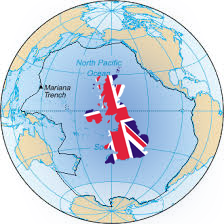04 February 2021
The Trans-Pacific
Tow us round!
By Robert Kilconner

I always hated geography but maybe that is because I gave it up before O level when my studies had focused on the Canadian tundra; all I can remember about that is that nothing much happens there unless you are unlucky enough to be attacked by a bear. Still, I do at least know that Canada has a Pacific coastline which is presumably why it is a member of the Comprehensive and Progressive Trans-Pacific Partnership, a trading bloc whose current members are Japan, Canada, Mexico, Singapore, Australia, New Zealand, Brunei, Malaysia, Vietnam, Chile and Peru. Now, although I don’t pretend to be an expert on all these places, or possible aspirant members such as the USA and India, I bet that the Pacific coastline is common to all of them which makes it odd that we have applied for membership, because the only ocean which washes our shores is the Atlantic.
Odd, yes, but how odd? One of the reasons given for leaving the EU was that it would enable us to get closer to Asia, the continent expected to dominate in a digital age and this certainly looks like a move in that direction. It is true that the geography seems surprising but one of the things the world has learned from its successive lockdowns is that nowadays actual presence matters much less than it did. You can hold business meetings in London from a farm in Peru, and communication across the continents is just a matter of nimble use of the Internet. Perhaps, then, the criteria for good trading partners are changing. It is no longer necessary to be physically close. The important thing is common interest and aligned values and views on regulation.
Are the members of the Partnership likely to share our values? They certainly vary culturally although a majority have been British at one time or another. Those who criticise our participation say that it will mean lowering standards and may involve sharing valuable government information with those who are inclined to profit from it. Probably that is so and it is likely too that the EU will have more checks and balances in place, accepting more bureaucracy as the price of better protection for its citizens.
That is a perfectly fair criticism but it misses the central point. If Asia is to be the centre of innovation in the future then it is Asia which will reap the prosperity and Asia which will have to find the cutting edge solutions to questions about information sharing and privacy. Europe may give better standards but history is dictated by those at the crest of the wave and if protection is bought at the expense of innovation it will be pointless. In the end the world will have to conform to the Asian way of doing things.
It is hard to tell whether membership, if it goes ahead, will deliver us anything in the short term. Perhaps it is a backdoor way to a trade deal with the States or perhaps that is just being optimistic. Perhaps it is a bulwark against China. Whatever the truth of all this, however, one thing is clear. We have set out our stall for the future as a nation of trading innovators. If we are going to succeed in that we need to be where the action is and if that means Asia then we need to be linked in to that part of the world. On that basis alone this move seems right, so hitch up those two aircraft carriers to the shoreline and order them to pull the UK round into the Pacific. At least we will get a warmer February.

